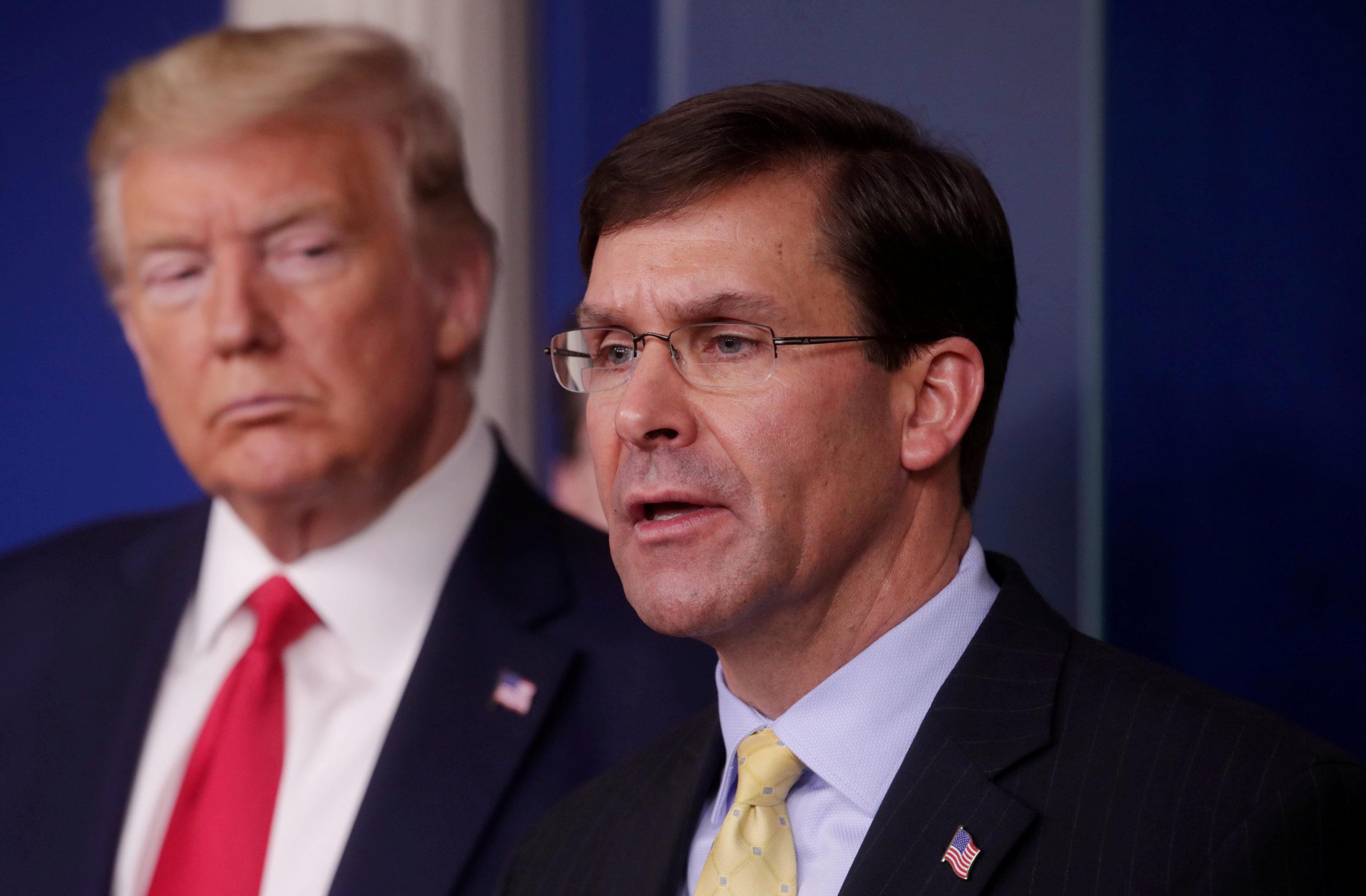WASHINGTON, Nov. 9 (Reuters) - U.S. President Donald Trump said on Monday he had “terminated” Defense Secretary Mark Esper, signaling he may use his final months in office after defeat at the polls to settle scores within his administration.
Trump had split with Esper over a range of issues and was particularly angered by his public opposition to Trump’s threats to use active duty military forces this summer to suppress street protests over racial injustice after police killed George Floyd in Minneapolis.
Democrats reacted with alarm, saying Trump’s move sent a dangerous message to America’s adversaries and dimmed hopes for an orderly transition as President-elect Joe Biden prepares to take office.
“The abrupt firing of Secretary Esper is disturbing evidence that President Trump is intent on using his final days in office to sow chaos in our American Democracy and around the world,” said House of Representatives Speaker Nancy Pelosi.
Representative Adam Smith, the Democrat who leads the House Armed Services Committee, condemned Trump’s decision as “childish” and “reckless.”
Trump said on Twitter that Christopher Miller, director of the National Counterterrorism Center, was taking over as acting secretary of defense.
“Mark Esper has been terminated,” Trump wrote in a tweet, adding that Miller would be acting secretary “effective immediately.”
U.S. defense officials, speaking on condition of anonymity, said White House Chief of Staff Mark Meadows called Esper minutes ahead of time to alert him that Trump would be firing him through Twitter.
As Trump put into motion a quick, unceremonious exit for Esper, Miller arrived at the Pentagon building just an hour or so after Trump’s announcement -- before the Pentagon itself had even issued a statement acknowledging Esper’s dismissal.
It was unclear if Esper was still in the building at the time Miller arrived.
Sources said Esper had long been preparing for his resignation or dismissal following last week’s election, particularly if Trump were to win a second term in office. The fact that he dismissed Esper even after losing the election, however, was not a given.
In a letter to the Defense Department issued early Monday evening, Esper said he was stepping aside aware that “there is much more we could accomplish.”
Esper commended the military for remaining “apolitical,” a refrain that he often used and which Trump’s opponents saw as implicit criticism of the president’s attempts to portray the military as his constituency amid defense budget hikes.
MORE FIRINGS?
Paul Frymer, professor of politics at Princeton University, said Trump’s firing-via-Twitter was “typical of his whole presidency” and cautioned it could spell danger for Anthony Fauci, director of the National Institute of Allergy and Infectious Diseases, who has also clashed with Trump.
“He can’t control his impulses or temper and he demands loyalty to him over policy, constitution or anything else,” Frymer said.
Trump has had an uneasy relationship with the Pentagon, where Esper and top brass have repeatedly sought to avoid being seen as a political instrument of the Trump administration.
Esper’s predecessor, Jim Mattis, quit in 2018 over policy differences with Trump, including on Syria. Mattis in June criticized Trump as the “first president in my lifetime who does not try to unite the American people - does not even pretend to try. Instead he tries to divide us.”
Like Mattis, Esper also disagreed with Trump’s dismissive attitude toward the NATO alliance and was wary of Trump’s inclination to see U.S. military alliances through an explicitly transactional lens even as he backed Trump’s calls for allies to increase defense spending, sources said.
But he also split with Trump on headline-grabbing issues, including Esper’s desire to shield Alexander Vindman, then a lieutenant colonel working at the White House, from retaliation over his testimony in Trump’s impeachment inquiry.
Michael O’Hanlon at the Brookings Institute think-tank said he did not believe Trump was likely to embark on a damaging shakeup of U.S. national security policy despite firing Esper.
“He will want to believe he has some kind of reasonable legacy — in economics, in strengthening the military, in not starting new wars,” O’Hanlon said, noting Trump might want to try to run for office again in 2024.
